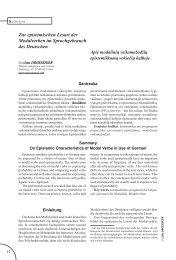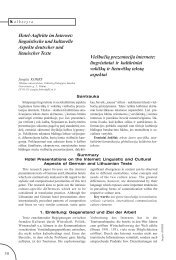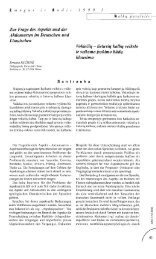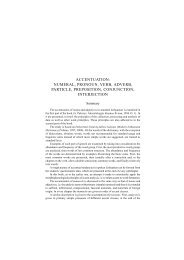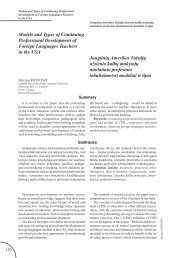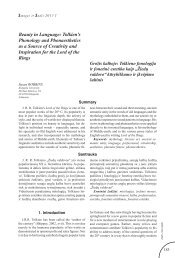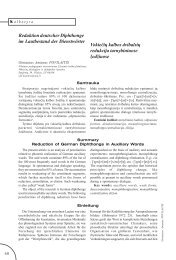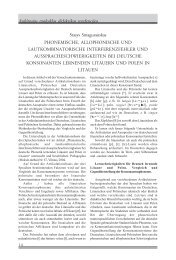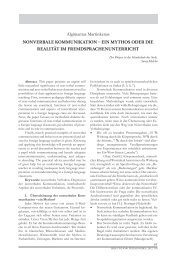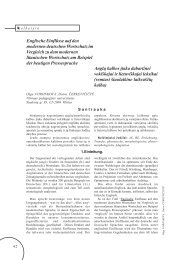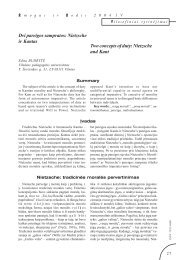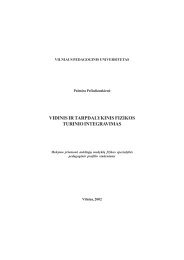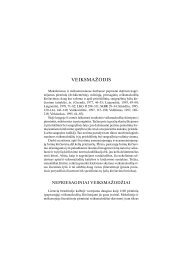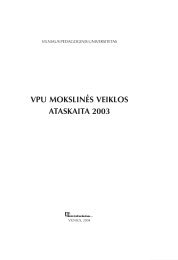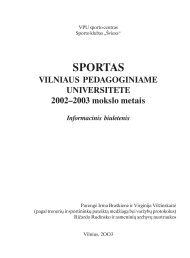visas tekstas - VPU biblioteka - Vilniaus pedagoginis universitetas
visas tekstas - VPU biblioteka - Vilniaus pedagoginis universitetas
visas tekstas - VPU biblioteka - Vilniaus pedagoginis universitetas
Create successful ePaper yourself
Turn your PDF publications into a flip-book with our unique Google optimized e-Paper software.
12<br />
Substrate phonetic effects in North Russian dialects<br />
bilingualism, normally leading to interaction of the<br />
two languages. In some areas Finno-Ugric languages<br />
are still spoken (e.g.Vepsian), but on a larger area<br />
only Russian dialects survive. Yet, some traces of<br />
substrate influence are still found in North Russian<br />
dialects, and their role in local accents has been<br />
underestimated so far.<br />
The problem with substrate effects does not only<br />
resolve into the fact that they are underestimated<br />
or even neglected. Research in this field requires<br />
competence in both Russian dialectology and Finno-<br />
Ugriс studies. These two branches are traditionally<br />
treated separately and irrespective of one another.<br />
Specialists in Russian dialectology hardly ever appeal<br />
to substrate and prefer to concentrate on inherent<br />
features of the dialect that could result in a certain<br />
effect. In fact, substrate is only appealed to when<br />
all possible means to explain the effect in terms of<br />
inherent phonetics are exhausted, and no clear proof<br />
is commonly demonstrated, so the very concept of<br />
substrate turns vague and not convincing.<br />
Substrate effects in North Russian dialects are best<br />
investigated in the field of lexis. Much fieldwork has<br />
been done to discover words of Finno-Ugric origin in<br />
North Russian (mainly North-West Russian) dialects,<br />
and several books appeared on substrate words and<br />
their etymology (see Мызников, 2003; Мызников,<br />
2004). The number of substrate words in these regions<br />
amounts to one thousand, and these words are<br />
normally concerned with nature, landscape, human<br />
activities, such as fishing and hunting, and were obviously<br />
taken on by the Slavic newcomers from the<br />
indigenous peoples. The study of substrate words is<br />
carried out by specialists in Finno-Ugric languages<br />
who aim to find the closest equivalents of substrate<br />
words and thus to identify the Finno-Ugric language<br />
they were borrowed from. Also, development of<br />
meaning is studied as well as phonetic adjustment of<br />
a foreign word to Russian articulation basis.<br />
In grammar, substrate effects are arguable. There<br />
are few clear-cut cases in North-Russian local grammatical<br />
systems that are parallel to the patterns used<br />
in substrate Finno-Ugric languages. Among the most<br />
probable examples of the kind is the use of nominative<br />
case (instead of accusative) for a direct object<br />
with infinitive, which must be due to the same pattern<br />
in Finno-Ugric.<br />
In phonetics, the influence is much more difficult<br />
to trace. A reasonable reference to substrate in phonetics<br />
should imply a comparison of phonetic and<br />
phonological systems of both languages and a clear<br />
demonstration of the factors that caused the sound<br />
change. Yet, it is possible to detect substrate effects<br />
Šiaurės rusų dialektų fonetiniai pakitimai: substrato<br />
poveikis<br />
from Finno-Ugric languages in present-day Russian<br />
dialects and in Old Russian manuscripts that reflect<br />
local accents. Further in the abstract, we focus upon<br />
such unresolved issues of substrate influence.<br />
In numerous North Russian dialects, particularly<br />
in Karelia, the fricative [j] sound is lacking from the<br />
articulation basis of the dialect speakers. It is consistently<br />
substituted by an occlusive sound described<br />
either as occlusive [j], or as a very palatalized [g’’].<br />
Old Russian manuscripts give evidence of the latter,<br />
with examples like гехали, угезд, пригежалъ, found<br />
in 17 th century local North Russian texts (Галинская,<br />
2002, 68–70). In the course of expedition (summer<br />
of 2007, Vologda region) we made a record, which<br />
shows consistent use of a very palatalized [g’’] instead<br />
of [j]: [mog’’a], [g’’a], [os’en’g’’u], [s’em’g’’a].<br />
The speaker was a bilingual Vepsian woman, and<br />
fricative [j] was absent from her articulation basis.<br />
In this particular case, substrate effect is evident, as<br />
lack of [j] is a specific feature of Middle-Vepsian<br />
dialect. Thus, a bilingual Vepsian speaker replaces<br />
[j] in Russian words with a sound closest to it in<br />
her articulation basis, i.e. [g’’]. Substrate nature of<br />
this effect was first assumed in 1986 (Суханова,<br />
Муллонен, 1986), and the latest research proves this<br />
assumption right.<br />
A similar effect occurs when fricative [h] sound<br />
is substituted by occlusive [k], e.g. [kl’ev], [kutor],<br />
[krapet’], [kolodno] instead of [hl’ev], [hutor], [hrapet’],<br />
[holodno] respectively. This effect is found in<br />
many Russian dialects, though it is never a consistent<br />
sound change and occurs only in a number of<br />
words. It must be due to substrate influence, as most<br />
Finno-Ugric languages, such as Karelian, Vepsian,<br />
Komi, etc. lack [h] from their sound system (Русская<br />
диалектология, 2005, 56–57).<br />
Another point to mention is pronunciation of<br />
European [l] sound instead of palatalized Russian<br />
[l’], an effect that is not so common as that with the<br />
substitution of a non-palatalized Russian [l]. Still,<br />
it is found in north-eastern Russian dialects and in<br />
a great deal of Old Russian manuscripts, including<br />
birch-bark documents from medieval Novgorod.<br />
Such cases of sound substitution are evident from<br />
the comparison of phonological systems of North<br />
Russian dialects and Finno-Ugric languages that<br />
had been used by indigenous population in the past.<br />
Apart from these, substrate effects show in more<br />
complicated phenomena, involving not only detached<br />
sounds, but phonological categories as such. For<br />
instance, some Russian dialects are known to differ<br />
from standard Russian in the correlation of voiced<br />
and voiceless consonants. This is supposed to cause<br />
Irina V. BEGUNTS



